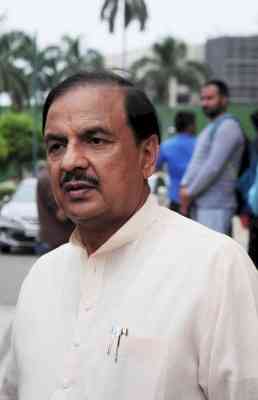Supercapacitors might help to replace use of petrol one day: Prof Apparao M. Rao: Nano Material Expert
Author(s): City Air NewsProf. Apparao M. Rao, Director of Clemson Nanomaterial Institute, Clemson University, USA giving his keynote address. Hyderabad, December 19, 2017: Imagine charging your mobile phone in just a few seconds or electric...


Prof. Apparao M. Rao, Director of Clemson Nanomaterial Institute, Clemson University, USA giving his keynote address.
Hyderabad, December 19, 2017: Imagine charging your mobile phone in just a few seconds or electric car in only a few minutes. Electric buses which were once a science fiction are now a reality. These and many exciting subjects came up for discussion at the ongoing International Conference on Advanced Functional Materials 2017 here at the Rajiv Gandhi University of Knowledge Technology(RGUKT), Basar in Adilabad district.
Supercapacitors might help to replace the use of petrol one day. Ground-breaking research has resulted in the development of technology that could revolutionize the capabilities which until recently was not possible. The best researchers in the world are working on it. China has already made progress in this area, shared Indian born American Professor Apparao M. Rao, Nano Material Expert, Director, Clemson Nanomaterials Institute, 128years old Clemson University of America while delivering Key Note address at RGUKT.
While delivering his keynote address on “Energy and our future” to 200 plus delegates from across the globe, Prof. Apparao M. Rao, whose research in Nanoscience and Nanotechnology has been cited over 30,000 in the open literature.
He shared the story of energy technology at Clemson Nanomaterials Institute. He talked mainly energy generation/production and its storage. He shared oil consumption projections for 2030 and said that only Japan would be able to manage well its oil consumption without much growth in it compared to other countries. And there is a search for alternate energy sources, he told. Prof Rao, a Telugu man who served as Chairman of several international conferences, spoke about Triboelectricity and how it can be stored and used later.
Triboelectricity is a charge of electricity generated by friction.
Speaking further, Prof Rao added that the Triboelectric Nanogenerators could power cell phone / small devices with the generator placed in shoe soles. The same technology can be incorporated into floor tiles to generate electricity. This is a new technology which is about 3-4 years old and cheaper than other alternative sources like wind or solar. The same technique can also be built-in textiles. He gave an example of LED jackets that light up without any external power source/battery and can be used on people working in night time on highways, etc.
China wants to implement Triboelectric Nanogenerators to power street lights, etc.. And wants to harness and generate energy where a lot of people walk. He also spoke about Supercapacitors which might help to replace the use of petrol one day.
China is experimenting with a new form of electric bus, known as Capabus. Capabus is a capacitor vehicle or capa vehicle. Supercapacitors are then charged on each bus stop with a pantograph (like a tram). 30 seconds are enough to charge the bus to 50%, and it takes 80 seconds to charge to 100%.
It runs without continuous overhead lines (is an autonomous vehicle) by using power stored in large onboard electric double-layer capacitors (EDLCs), which are quickly recharged whenever the vehicle stops at any bus stop.
Electric buses are gaining prominence in various parts of the world. China initially experimented and now commercially deployed them all over China. China is known for stringent emission standards, and hence, Capabuses found increased acceptance, he added. Prof Rao also talked about similar buses in Germany and Singapore.
Replying to a query from the audience on practical applications and its usage in present day he said that China is generating Triboelectricity in fishing nets. China is the leader in this followed by Korea, he said. The commercial application of this technology can happen in the next three years, he opined.

 cityairnews
cityairnews 













